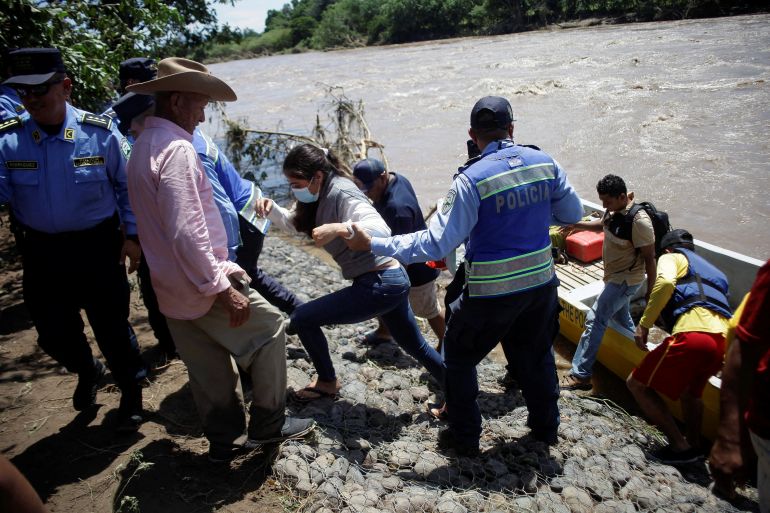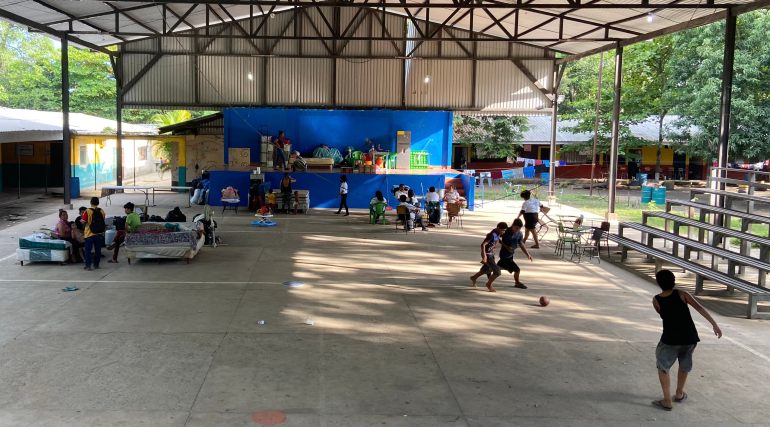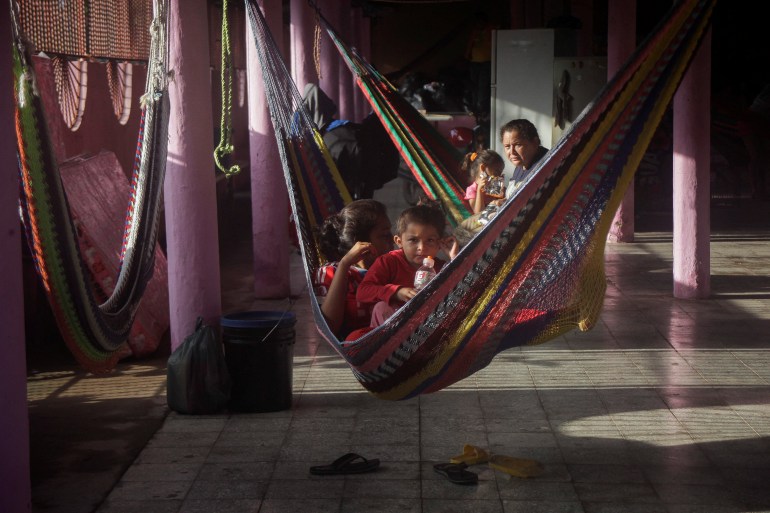Hurricane Julia pushes displaced Hondurans to consider migration
Sula Valley residents say inadequate government response to past storms has left them exceptionally vulnerable.

San Pedro Sula, Honduras – Nearly two years after hurricanes Eta and Iota pummelled northern Honduras, flooding entire neighbourhoods and causing widespread devastation, 40-year-old Marlen Oliva has fled her home again this month as Hurricane Julia swept through.
Oliva, who sought refuge at a government shelter in San Pedro Sula, said her family was still struggling to recover from the financial hit of the previous storms when Julia arrived. To support their five children, Oliva and her construction-worker husband had attempted to migrate to the United States last year, but they were deported after reaching southern Mexico.
Keep reading
list of 3 itemsPhotos: 28 dead as storm Julia dumps rains in Central America
Three dead as Hurricane Bonnie passes over Central America
“Things are just getting worse,” Oliva told Al Jazeera, referencing the country’s economic situation and its vulnerability to natural disasters. “With this situation, what you do is migrate.”
They were among hundreds of thousands of Central Americans estimated to have attempted to migrate north after the deadly 2020 hurricanes. Border officers encountered more than 319,000 Hondurans trying to cross into the US in 2021, about a fifth more than pre-pandemic figures. That data does not include people such as Oliva, who did not even make it that far.
According to the Red Cross, more than 1.5 million people were displaced in Central America after Eta and Iota, with almost a third of those hailing from Honduras. Now, with hurricane season again in full swing, aid groups and local leaders worry that another migration crisis is brewing.

“Even though two years have passed since [Eta and Iota], many people have still not recovered from the disastrous impacts that the floods provoked,” Cesar Ramos, who works with the Mennonite Social Action Commission migrant support programme in Honduras, told Al Jazeera.
“If the authorities don’t provide immediate, timely care and consider this truly as an emergency, then people will find themselves having to migrate,” he said. “The truth is that people can’t wait.”
Lack of prevention
Hurricane Julia, which made landfall in Nicaragua on October 9, affected more than 100,000 Hondurans, according to government estimates. Thousands fled to government shelters, while others sought refuge in churches, or with family or friends.
With waters knee-high, some communities were isolated for days, their roads impassable. Losses of banana, corn and African palm crops were estimated to have cost the Honduran economy millions of dollars.
While Julia, as a Category 1 hurricane, was relatively weak compared with past storms that have hit the region, Honduran communities in the Sula Valley are particularly vulnerable due to their proximity to rivers, such as the Ulua and Chamelecon.
While a system of dams had previously protected many neighbourhoods, much of this infrastructure was broken or seriously damaged in 2020 — and the dams have yet to be repaired, according to residents and local leaders.
“With Julia, what we have are the consequences of an institutionality that never responded to the deterioration of the river basins and dams,” Reverend Ismael Moreno, a local human rights activist and radio director, told Al Jazeera. “The people pay the consequences of state irresponsibility and the lack of prevention.”

Honduran President Xiomara Castro, who took office this past January, has criticised the previous administration for failing to coordinate a proper disaster response. Her government told local media that it had invested $5.4m since June to repair broken dams in the Sula Valley and in the department of Atlantida, two of the most vulnerable areas.
The Honduran disaster response agency COPECO did not respond to Al Jazeera’s request for comment.
But while Moreno said much of the blame for the latest flooding lay with the previous government, the Castro administration could have done a better job of preparing for hurricane season this year.
“We need serious prevention policies to be put in place for 2023, so that next year we can have more prevention responses and fewer people affected,” he said.
Finding solutions
At a school converted into a public shelter, many residents displaced by Hurricane Julia criticised the government for failing to meet their needs beyond offering temporary refuge. After two nights at the shelter, they said municipal officials warned them that classes would soon be starting, and they would thus have to leave.
Their options were scant, residents told Al Jazeera. They could go back home, but that would mean paying more than $100 for a truck to move back their mattresses, fridges, washing machines and other belongings — and if another storm were to hit soon afterwards, they would have to move everything out again. Losing furniture or appliances to flooding would be devastating for many families who earn $5 to $10 a day as informal vendors.
While the government said they could move to another public shelter, residents said they were worried about entering neighbourhoods controlled by rival gangs, which could put their families at risk of violence.
“Our only option is that we stay here or we go sleep under a bridge,” Keyla Beltran, a displaced resident staying at the San Pedro Sula shelter, told Al Jazeera. “But I’m not going to expose my kids to being killed.”
Beltran said she planned to stay until government authorities kicked her out, prompting some of her neighbours to nod in agreement. “We have to find the solutions ourselves,” she said.
Oliva said the conversation reminded her of why she and her husband had tried to migrate before: hurricane season left them with few options.
While the worst of Hurricane Julia has passed, there will surely be another storm around the corner. Every time it rains, there is no construction work for her husband. Their family is already late on loan payments for their house, and if they were to lose anything else, there would be no money to replace it.
“We want to leave again this year,” Oliva said. “In December, if God allows.”